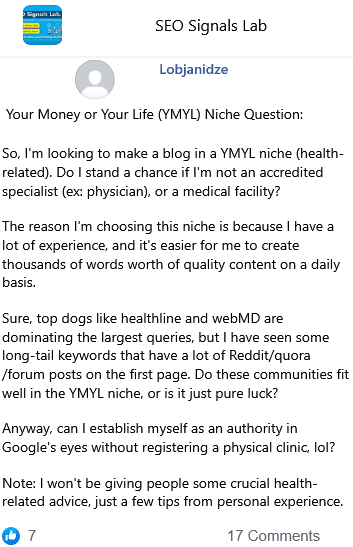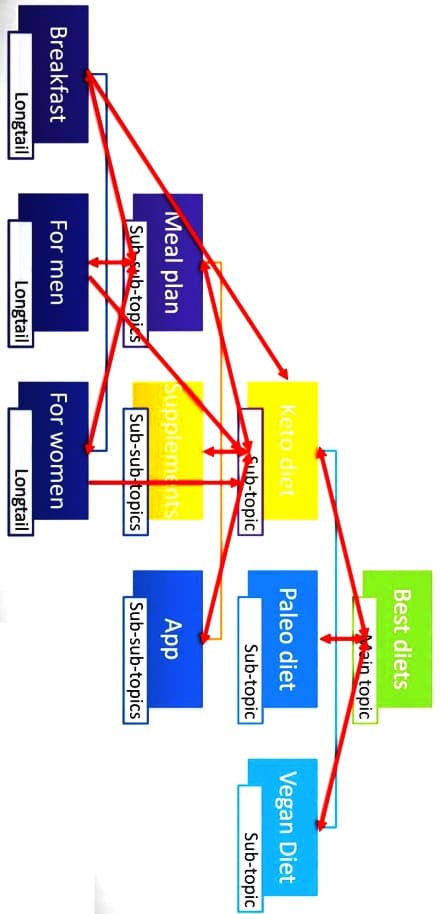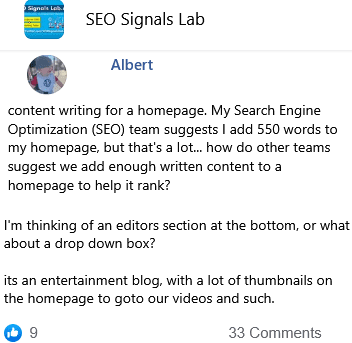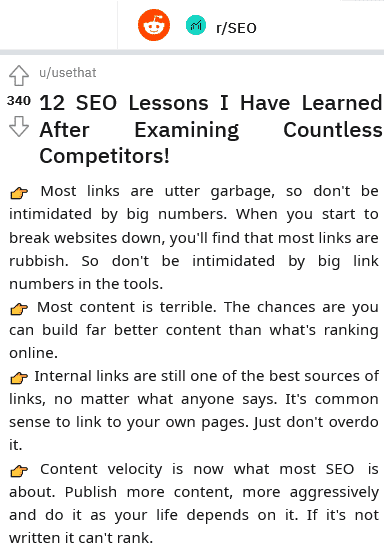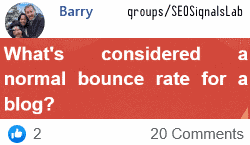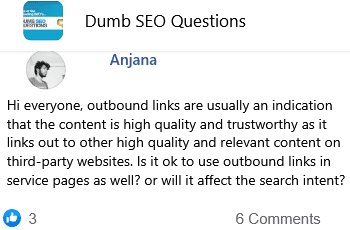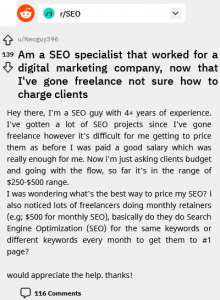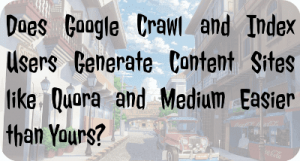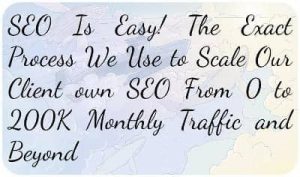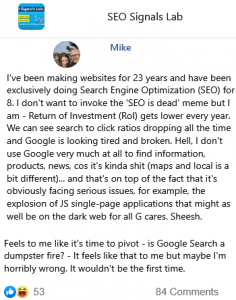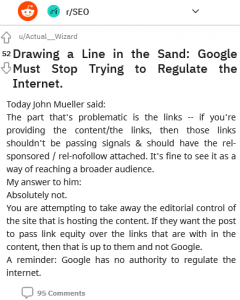Steven Kang 👑
Question for the experienced SEO users Regarding Your Money or Your Life (YMYL)
I had a meeting with the head of the largest travel site in Japan yesterday, and the YMYL topic came up. He believes Google may have transitioned from the YMYL niche to YMYL pages due to COVID. He believes some pages dropped in rankings due to it. I thought it was an interesting observation.
Come to think of it, and which was mentioned during the meeting, I saw a client in the pest control niche and its content related to ‘ant bites' being replaced by health-related sites covering the same topic on the Search Engine Result Page (SERP)
What's your observation? Is there any merit to his thought process?
28 👍🏽2 💟3019 💬🗨
📰👈
In the specific case of "ant bites" – I'd say that this is more of a search intent issue than anything else.
An exterminator is not really the person I want to call if I get bitten by an ant. An exterminator is someone I would call to get rid of the ants so I don't get bitten in the first place.
There are DEFINITELY lots of changes with COVID though. I have a client in medical waste disposal – which really has nothing to do with COVID, but the COVID flag pops up on many searches that seem unrelated to that and that bring up their site. This is happening less and less in recent months for them though… so my suspicion here (and it's a suspicion, not a fact) is that:
If Google doesn't understand your site very well because it's new or your not sending signals to have Google actually understand it (i.e. you're still playing the "Match The Keyword" game exclusively) – if Google spots some of these stop words that relate back to COVID – it will err on the side of caution and put you into a little sandbox. Actually… no… it's more like a laboratory. You get put in the laboratory for Google to run some experiments on you.
During that period, Google tries to figure out exactly HOW you (and the words it found) may or may not relate back to COVID. In our case, Google is realizing that we use the words because we help get rid of those things that a hospital uses to treat COVID and then have problems with the leftovers and waste that comes from that. Once Google figures that out (or starts to – we're still in a bit of flux with some things not quite sorted out yet and others back to normal) it will then decide how to handle it.
Is it happening on a page by page level? I don't think so. But it DOES seem to be happening at a level that affects known entities. So, if a page talks about an entity that Google is fairly certain will almost always relate to COVID, it's more likely to treat that mention (and the content on the page) as something dealing with COVID. And it might treat other pages in that same neighborhood on your site the same way.
For example… Amazon has a section for masks. That section is surely treated differently than the section for Sesame Street Toys. But at that level – for practicality sake in terms of how computers work and classify things – I'd say it's a "categorical" thing – not a page by page thing – unless a page in another category talks about it specifically. So, for example, "Ernie and Bert with COVID Masks Dolls" might get flagged for a warning – but that will probably go away if G feels the need to run it's tests and confirm or deny the connection. Or it may just leave it there because it's not an important enough page to bother.
It's a fluctuating thing, really. At least in my opinion. I've got no "facts" – just observations from several clients that hit the niche and my own research on trying to figure out how to handle it.
Marty Marion 🎓
My thinking is that since Google ranks pages not sites, but uses the entirety of a site for context and evaluation, there is no reason to doubt that on a primarily non-YMYL site that some pages could easily be evaluated in the light of Your Money or Your Life (YMYL) and others not.
And the same thinking works in reverse where a a truly YMYL site has pages that could be evaluated as non-YMYL pages.
I'll take a few questions now, but no autographs.
This was my thinking too before I read your comment 👍
💟
Marty Marion 🎓 » Igor
Great minds think alike…
📰👈
Micha
Since there is no E-A-T algorithm and no E-A-T signals, it's a lot like Google is wearing a blindfold while playing Darts. They know where the dart board is and they have practiced throwing darts often enough that they can usually hit the board. But they still get a lot of this stuff wrong.
That's the point of many of their updates: to improve their aim, even though they are still wearing a blindfold. The Quality Raters tell them how close they are getting to the mark.
So the travel site exec might be 100% correct in saying that Google has changed how it's evaluating their kind of content.
Gossage
My last job was for a beauty retailer and the blog took a big hit. A lot of the articles, especially around skincare, were dropping out of SERPs in favour of Healthline and the likes.
I did lots of briefs to resolve this, including guest contributors, citations and a more technical writing style. Unfortunately, they were all beauty writers and went right over their heads so they kept writing very top level content which didn't go anywhere. I was in the process of building a network of healthcare professionals to guest write for us before I left.
Ammon 🎓
There's a couple of different aspects to this.
The first is that the borders and boundaries of what is or is not 'medical' or 'financial' can change and are a little bit arbitrary. It's not a black and white thing, and it fades through a shedload of shades of grey, somewhere in which one draws a line. Plus, with intent being more fluid now, more dynamic, and more based on machine learning, things may cross into and out of an intent space that is deemed to be covered by YMYL logic.
The second is that certain parties made 'fake news' an internationally trending topic, way outside of YMYL. Really politicized the whole thing of when accuracy, authority, etc should be more important – long before Covid even. Politics and Covid both have highlighted the issue of cult-like beliefs, of fact-checking, and of conspiracy theories, and a lot more.
Google certainly were aware of this long, long before Covid, and had specific history with anti-semitic and holocaust denial sites having made news that was far from flattering to Google.
Overall then, I don't think it is quite right to frame this as an expansion of Your Money or Your Life (YMYL), but rather is simply greater global awareness, criticism, and calls for accountability on misinformation and disinformation, and the part that platforms such as Google and Facebook play in spreading that disinformation.
Google may simply look at YMYL for ways they have approached this in a specific niche or two in the past, but I think they'd be looking for a better solution, significantly, rather than just widening a somewhat flawed one. Other than when forced to fast, temporary, make-do action because of govt pressures, of course.
📰👈
Discussion 1: How to Create a Website with Your Money or Your Life (YMYL) Niche?
Lobjanidze
Your Money or Your Life (YMYL) Niche Question:
So, I'm looking to make a blog in a YMYL niche (health-related). Do I stand a chance if I'm not an accredited specialist (ex: physician), or a medical facility?
The reason I'm choosing this niche is because I have a lot of experience, and it's easier for me to create thousands of words worth of quality content on a daily basis.
Sure, top dogs like healthline and webMD are dominating the largest queries, but I have seen some long-tail keywords that have a lot of Reddit/quora/forum posts on the first page. Do these communities fit well in the YMYL niche, or is it just pure luck?
Anyway, can I establish myself as an authority in Google's eyes without registering a physical clinic, lol?
Note: I won't be giving people some crucial health-related advice, just a few tips from personal experience.
7 👍🏽717 💬🗨
📰👈
Yes, you can establish yourself as an authority in a YMYL niche without having a bunch of qualifications or credentials.
The theory that you need medical qualifications to rank for medical terms or financial qualifications to rank for finance terms does not hold up to the reality of what you'll find as you review and analyze the brand, author, and trust signals of the websites ranking for them.
In theory it's a great concept as it would be ideal if Google could develop ways to measure EAT algorithmically, but the concept just doesn't apply very well to the real world Search Engine Result Pages (SERP)s you get as you analyze YMYL search queries.
Case in point:
https://www.farrinstitute.org/https://app.ahrefs.com/v2-site…/overview/subdomains…All EAT signals for this site are fake and yet it still ranks well for many YMYL search queries and generates tens of thousands of visitors each month from them.
https://www.farrinstitute.org/author/kimberly-langdon-m-d/https://www.google.com/search?q=Kimberly+Langdon+M.D.https://www.farrinstitute.org/author/kire-stojkovski-m-d/https://www.google.com/search?q=Kire+Stojkovski+M.D
Interesting, so are you saying that this site is claiming these people to be authors without their permission?
Dolman » Gossage
No. Dr. Langdon is quite the prolific writer with articles and content posted to dozens upon dozens of websites.
https://heelthatpain.com/authors/dr-langdon-md/https://www.senioradvice.com/articles/authorbio/108https://naturalfertilityvip.com/kimberly-langdon/https://www.therecoveryvillage.com/editorial/kim-langdon/https://parentingpod.com/author/drlangdon/https://www.substanceabuse.com/our-experts/dr-kimberly-langdon-m-d/https://cbdclinicals.com/author/kimberlylangdon/Aside from her LinkedIn profile – which could easily be fabricated without much effort – there isn't much data to support her credentials as a MD and any which do, qualify here as an obstetrician/gynecologist (OB/GYN), not a foot, substance abuse or cannabidiol (CBD) doctor.
https://www.LinkedIn.com/in/kimberly-langdon-m-d-41847610/What qualifies her as a medical authority capable of speaking on all of these topics despite her lack of knowledge or expertise in any of these fields?
Mark » Dolman
I wonder though if author profiles matter that much tbh. I've seen several finance sites kill it w no authors profiles and not many on page EAT signals for that matter…mostly was all just links
Dolman » Mark
Whether the fake data and information is posted on the website itself or there are external sources of reference to support them doesn't have much impact on how easily they can be manipulated to appear real to a computer algorithm.
Mark » Dolman
I agree…I'm just wondering if it matters to have author profiles much at all…
Dolman » Mark
For the benefit of your visitors as opposed to a bot or algorithm, your about us page and author profile pages offer the necessary context and relevance to position your brand and those writing content for it as an authoritative source on the subject matter.
Mark » Dolman
That makes more sense…and maybe it's one signal among many used
Kim » Dolman
Its quite funny what you are saying there. And I agree with you 100%. Once you start looking into Googles data its funny to see what its trying to do, but not quite get it. Maybe… maybe 5 or 10 yrs from now G is able to tell a real person with a real medical profession and who's not (if ever really…).
Kim
I would have no problem doing that, as long as you do the proper sources and citation based on research papers, edu/gov websites. Those are on the front page for your given keywords, many of them give their sources. Use their sources + add some extra sources on your as well. That will even more confirm what the sources you already have are saying. The more sources that says the same thing the better. Stay away linking to those who don't use sources. Those that use sources, just take theirs instead of using their website as the middle man (for ex WebMD). I would NOT go without making a website without using proper sources.
Karin
You can interview experts. You can credit authority sites. You can use press releases from university research labs. All these arrows will point to you being an expert. Cuz that's what experts do.
📰👈



